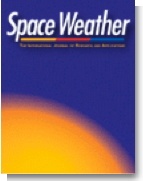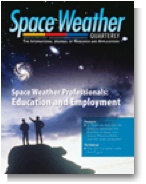...
| Section |
|---|
|
| Column |
|---|
| Telecon January 29 Agenda:Toll Free Number: 866-757-4161 Toll Number: 1-517-968-4405 Passcode: 5807653 Agenda: - Louis Lanzerotti: Editorial Report on continued production of SWJ and SWQ.
- Nancy Crooker: Potential submission to EOS as followup to her suggestion at the AGU Luncheon.
- Discussion about AGU/AMS and other partnerships
- Brooks Hansen: Progress on work to define Terms of Reference / Editorial Search Committee
- Brooks Hanson/Barbara Giles: Progress on work to provide visual prototype of SWQ using new Wiley special section software features.
Telecon January 17 Agenda:Toll Free Number: 866-757-4161 Toll Number: 1-517-968-4405 Passcode: 5807653 Agenda: - Louis Lanzerotti: Editorial Report on continued production of SWJ and SWQ. Last issue of the Quarterly for 2013 is underway and is basically finished. Very nice editorial this month introducing the solar cycle anniversary concept. Louis reports that the editorial side of the work is going well. Continues to solicit and receive non-technical material. The citation index continues to increase and we believe it will continue to do so as we are all being more viligant with activities that affect the index.
- Delores Knipp: Followup on her initiative to increase visibility and utilization: a SWJ version of Astrobites ("SWxbites"). Astrobites is a daily astrophysical literature journal written by graduate students in astronomy. Their goal is to present interesting papers in a brief format that are accessible to undergraduate students. Delores is going to try this out on her students this semester! The class has 28 aerospace engineers enrolled. In addition to HW, they will review SW paper and try to write "astrobite" type of summaries. Four or five paragraph summary. Here is an example written by one of the more advanced students.
- Howard Singer/Dan Baker: Summary of Discussions at AGU Editorial Board Luncheon (cryptic notes taken during the meeting are here). WANT MORE INFORMATION ON THE SPECIAL SECTION WILEY FEATURES, were not able to cover that in sufficient detail. There is a difference between 'special issues' and 'special collections". We were not able to explore any potential links between this journal and AMS and any connections with IEEE Explorer.
- Nancy Crooker: Potential submission to EOS as followup to her suggestion at the AGU Luncheon. Barb will circulate Nancy's message; all will reply back with further suggestions and encouragements.
- Paul Cannon: Ensuring the "mission statements" or "scope statements" for Radio Science, Space Weather Journal, and JGR-Space Physics are consistent and clear. Paul encourages an ~100 word description, with the aim to ensure little to no cross-over as much as that is possible. This is the text that goes in the OVERVIEW area of the journal's website.
- Barbara Giles/Brooks Hansen: Progress on work to define Terms of Reference. A template has been created and our subcommittee of Bob, Bob, and Howard will proceed with a draft.
- Brooks Hanson/Barbara Giles: Progress on work to provide visual prototype of SWQ using new Wiley special section software features. Hope to have this for our telecons by April? May be able to have something earlier than April. All agree that more discussion is needed as we are all uncertain as to how this should proceed.
- Besides status on the various initiatives, what should be the focus for next telecon? Bob McCoy reporting on AGU/AMS partnership to support also partnerships with IEEE Explorer? More information on the "special collections" / "special issues" software and features, and how SWJ/SWQ could take advantage.
Re Distribution List: We need to scrub that. Louis will help with that, AGU has already taken a pass wrt congressional staff, Howard will help too. AGU has started organizing the confidential search committee for a new Editor-in-Chief and hope to have the announcement out soon. Having this group involved will be very important. SEND suggestions for members of the search committee to Brooks. It is essential that everyone in this group be proactive in encouraging appropriate members of our community to apply.
In other news:Starting to keep a list of suggestions for articles, interviews, tutorials , etc. Peter Chi, editor of the SPA News, pointed to the Wiley online library subscription service specially noting the Space Weather Journal. Thanks for the "shout out" Peter! To ensure folks remain aware of the need to subscribe, we will add a "notes to the editor" page to remind future editors to post subscription information to the newsletters at least once/twice a year. Bob Robinson has contributed to a "history" page . Please take a look and consider what history you may be able to add. We'll want this material for our "Space Weather Journal First Solar Cycle" celebration. Article in the Politico re consequences of EMP and magnetic storms. Thanks Lou for the alert. AGU home page featured the news release for the very interesting lunar dust and radiation paper that was recently published in Space Weather. Next Telecon:
Wednesday, January 29 at 1pm Eastern
Wednesday, January 29 at noon Central
Wednesday, January 29 at 11am Mountain
Wednesday, January 29 at 10am Pacific
Wednesday, January 29 at 6pm GMT |
| Column |
|---|
| | Info |
|---|
| MEETING/TELECON INFO Next Telecons: |
|---|
Telecon #3
Fri, Jan 17 at 2pm Eastern
Fri, Jan 17 at 1pm Central
Fri, Jan 17 at noon Mountain
Fri, Jan 17 at 11am Pacific
Fri, Jan 17 17 at 7pm GMT Telecon #4
Wed, Jan 29 at 1pm Eastern
Wed, Jan 29 at noon Central
Wed, Jan 29 at 11am Mountain
Wed, Jan 29 at 10am Pacific
Wed, Jan 29 at 6pm GMT |
|
|
|
| Wiki Markup |
|---|
h2.
...
List
...
of
...
items
...
this
...
group
...
is
...
tracking:
...
- Values/directions voiced as wanting to preserve? (feel free to add/edit the list)
- further establish SWJ/SWQ as the premier policy magazine for the space weather-related research disciplines
- continually increase the number and citation rate of high quality research papers in the journal
- continually increase visibility inside and outside the research community
- printed version of quarterly to funding/policy stakeholders
- broad circulation of quarterly in some form as communication tool
...
- Longer-term issues:
- Explore/expand partnerships: AMS, AIAA, etc.
- How to assess the full "impact" of the journal, when the access/citation stats don't tell the full story.
- What is the desired balance between pursue "sponsored" support for the journal or quarterly or both?
...
...
Summary
...
of
...
points
...
made
...
in
...
various
...
emails/notes:
...
- Value to Community as identified in emails/telecon notes:
- important policy magazine for the Union and for a broad segment of membership
- premier journal for space weather
- the journal is the only society sponsored publication for operational space weather research
- quarterly is key for communicating ideas to people with limited science background
...
- Questions (summarized from emails and meeting notes):
- What should the business model for the Space Weather Journal be? Should move to open access with author fee? How can the commentary pieces be supported under that model?
- Is there a need for editorial scope change? How can we better enforce the distinctions to the science research journals such as Radio Science and JGR Space Physics?
- How should the Quarterly evolve? Should the content expand to highlight related content published in other journals?
- Is a separate composition/production stream necessary for the Quarterly? Can we use the production stream created for the new virtual journals to streamline production and enable electronic access?
- How to best balance the business model for the quarterly? What should be the proportion of print versus electronic access? Should we renew sponsored development and printing? How do the necessary writing professionals get their support?
- During this time of transition, how can we best support a continuous stream of the highest quality space weather research papers AND the important news that our stakeholders need to have presented to them? Can we put some attention on the journal/quarterly to better aid the editors in meeting the current production schedule and to smoothly transition into a new production environment?
| Section |
|---|
| |
unmigrated-inline-wiki-markup| h2. |
Background:
Space Weather Journal | Space Weather Quarterly |
|---|

This is a technical journal with impact factor: 1.37.
2012 ISI Journal Citation Reports Rankings: 34/56 (Astronomy & Astrophysics); 43/76 (Geochemistry & Geophysics); 46/74 (Meteorology & Atmospheric Sciences)
| 
This is a technical magazine,
which was part of the AGU News Division?
now part of Publications division?
The two publications serve both the scientific and the applications-oriented, “above the atmosphere” (particularly space physics and aeronomy, and planetary), membership of the AGU as well as engineers and related professionals who may not join AGU because of its scientific focus.
|
...
Purpose
...
and
...
Scope:
Space Weather Journal:
Proposed update for the website: Space Weather: The International Journal of Research and Applications is an online publication devoted to the field of space weather and its impact on the design and operations of technical and engineered systems, including telecommunications, electric power, and satellite navigation. The journal’s readers include engineers, system operators, systems designers, space weather forecasters, space weather modelers, as well as the research community.
...
Currently on the website: Space Weather Quarterly is a free, subscription-based print publication devoted to the impacts of space weather on technical systems, including telecommunications, electric power, radiation effects on space electronics, and satellite navigation. Space Weather Quarterly is a digest published by the American Geophysical Union that supports the journal, Space Weather: The International Journal of Research and Applications, which addresses the applications of space research findings and results to practical problems that face numerous government and industry entities that design and operate technical systems that are known to be influenced and affected by processes in the solar-terrestrial environment. Space Weather also publishes models of various solar system processes, as well as more integrated models, that are addressed to predictions and forecasts of solar and geomagnetic disturbances that impact technical systems.
...
...
Related
...
journals
...
and
...
publications:
The Journal of Space Weather and Space Climate (SWSC) is an international multi-disciplinary and interdisciplinary peer-reviewed open access journal which publishes papers on all aspects of space weather and space climate from a broad range of scientific and technical fields including solar physics, space plasma physics, aeronomy, planetology, radio science, geophysics, biology, medicine, astronautics, aeronautics, electrical engineering, meteorology, climatology, mathematics, economy, informatics. An online, open access electronic journal published by EDP Sciences, Les Ulis Cedex, France. Five paper and an editorial were published in 2011; 22 papers were published in 2012; and 30 papers and an editorial have been published thus far in 2013.
...

